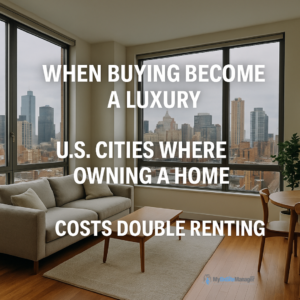For generations, buying a home has been the cornerstone of the American dream a sign of stability, success, and financial independence. But in 2025, that dream is becoming harder to reach, as new data reveals that owning a home now requires nearly twice the income of renting in many major U.S. cities.
A new report from Zillow shared by CNBC exposes just how out of sync homeownership affordability has become. On average, a household must earn over $106,000 per year to afford a typical home in the U.S. a staggering 80% increase over the income needed to rent the same type of property.
Let’s take a closer look at the widening affordability gap and what it means for renters, buyers, and the future of the housing market.
Where the Income Gap Is the Worst
Some cities are seeing affordability gaps so large that the income required to purchase a home is more than double what’s needed to rent. Here’s a breakdown of the most extreme cases:
| City | Income to Rent | Income to Buy | Ownership Premium |
|---|---|---|---|
| Austin, TX | $54,000 | $138,000 | +155% |
| Seattle, WA | $67,000 | $169,000 | +152% |
| San Francisco, CA | $136,000 | $339,000 | +149% |
| Los Angeles, CA | $106,000 | $279,000 | +163% |
| San Jose, CA | $151,000 | $374,000 | +148% |
What does this mean for everyday Americans? In cities like Los Angeles or Seattle, unless your household income has more than doubled in the last few years, you’re likely to find yourself priced out of buying altogether.
Why It’s Getting So Expensive to Own
The skyrocketing cost of homeownership isn’t due to one single factor it’s a combination of market conditions that have collided at once:
-
Interest rates have surged. With 30-year mortgage rates hovering around 7%, monthly mortgage payments are significantly higher than in past years even for the same home price.
-
Inventory remains low. There simply aren’t enough homes available for sale, driving competition and prices up.
-
Insurance and property taxes have risen. Owners today must budget for rising insurance premiums, HOA fees, and local tax hikes, adding even more burden to their monthly costs.
-
Stagnant wages. Income growth has not kept up with the pace of inflation and housing costs, making it harder for potential buyers to qualify for a mortgage.
What Renters Should Know
For years, the dominant narrative has been that “renting is just throwing money away.” But in today’s market, renting may actually be the more responsible financial choice at least temporarily.
Renting allows you to:
-
Avoid large upfront costs like a down payment.
-
Preserve flexibility during uncertain economic times.
-
Allocate money toward savings, debt reduction, or investments.
-
Wait for mortgage rates to drop before locking in a long-term financial commitment.
In fact, Zillow’s chief economist notes that in today’s climate, buying may not be worth it unless you plan to stay in the home for at least 5 to 7 years, just to break even on the high upfront costs.
What Aspiring Homeowners Can Do
If owning a home is still your goal, don’t give up just plan strategically. Here are a few ways to prepare:
-
Improve your credit score. A higher score can reduce your mortgage interest rate significantly.
-
Save aggressively for a down payment. The more you put down, the less you’ll borrow and the better your monthly payments will look.
-
Explore down payment assistance programs. Many cities and states offer financial help for first-time buyers.
-
Monitor mortgage rates and home prices. Timing your purchase when rates dip even slightly can save you thousands over time.
Bottom Line
The housing landscape in 2025 presents a tough reality: homeownership is no longer automatically the better financial move especially in high-cost cities. For now, renting offers a more flexible, affordable path for many Americans. And while that might feel discouraging, it’s also an opportunity to reset expectations, make smarter financial plans, and wait for the right moment to buy.
Read the full CNBC article here: U.S. cities where owning a home requires double the income of renting

